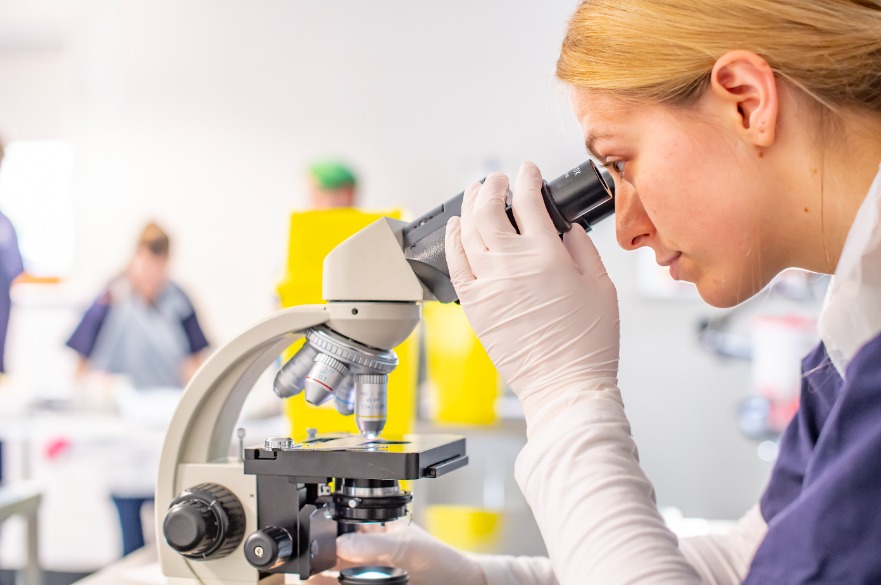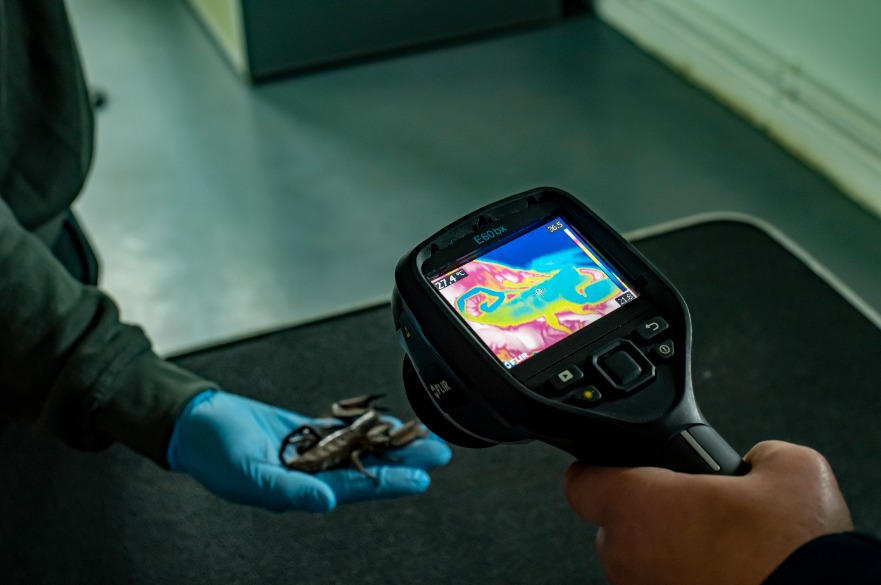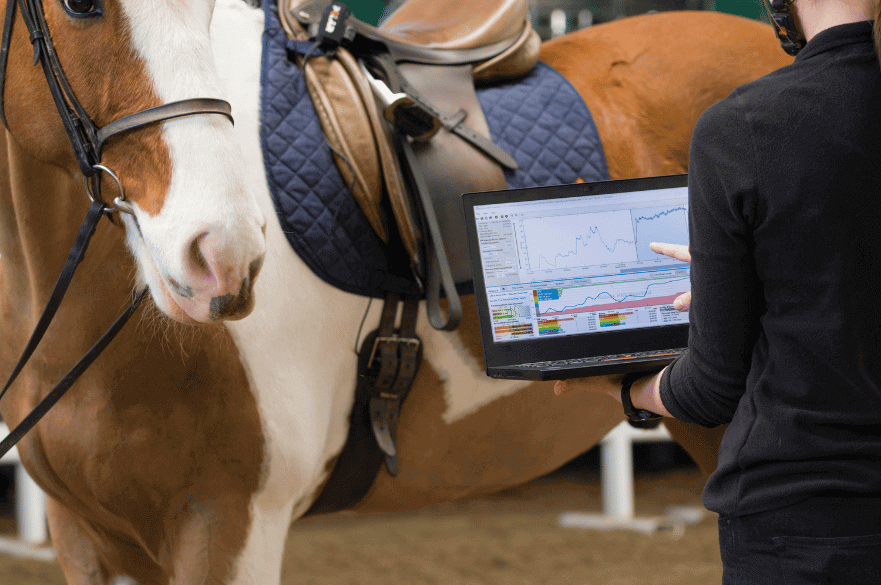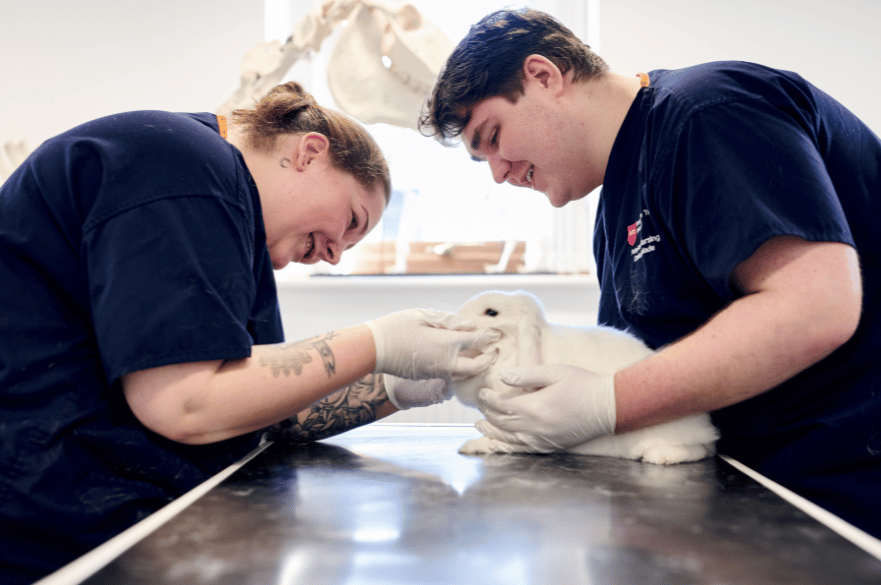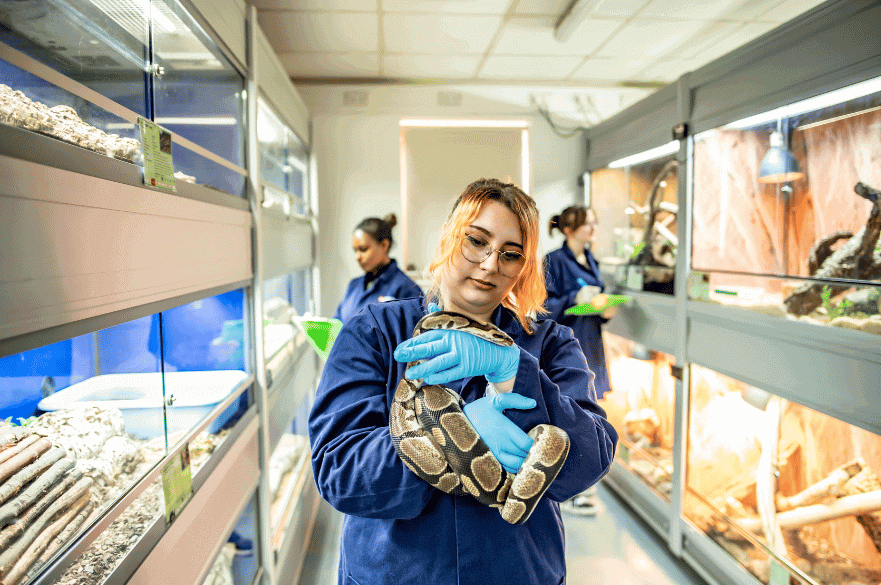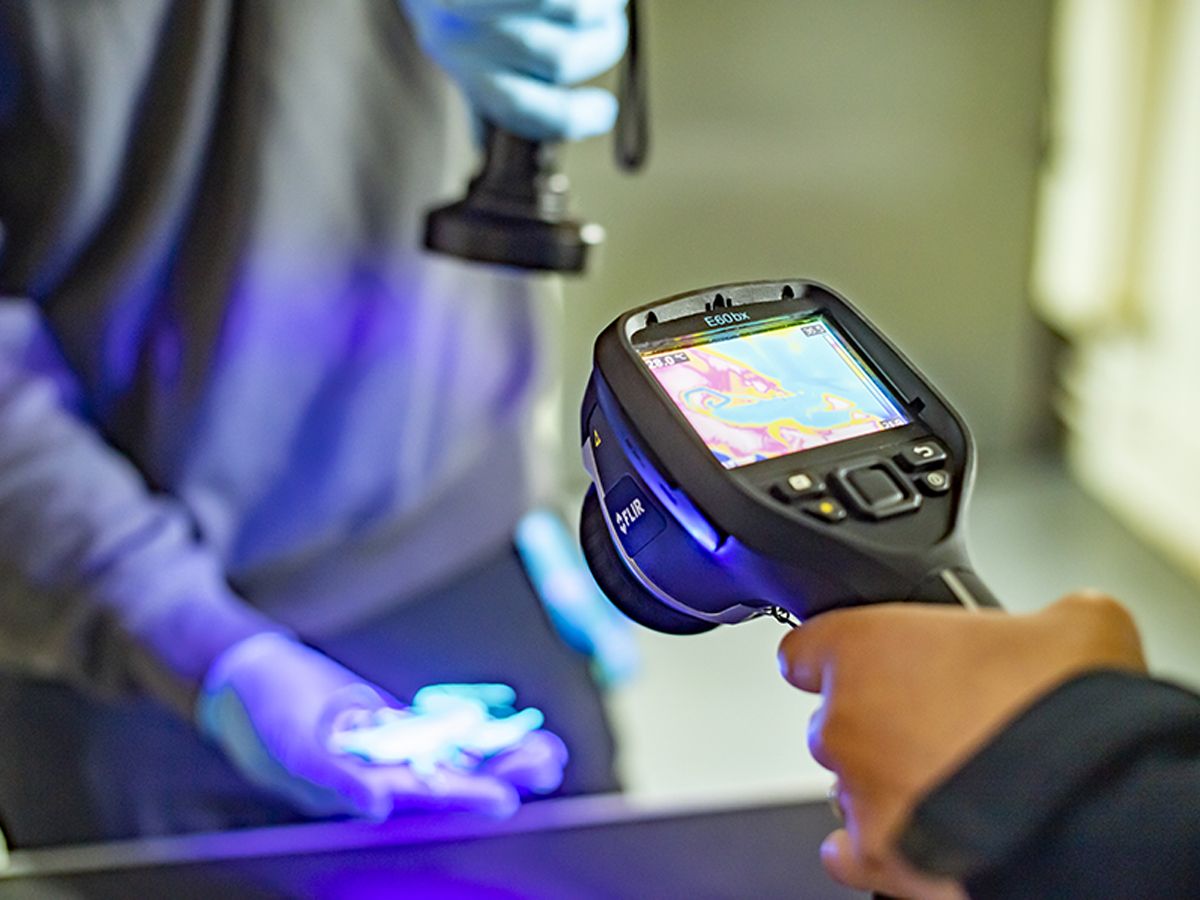About this course
This course is an integrated foundation degree, where you'll progress onto our BSc (Hons) Animal Biology course, once you successfully complete your foundation year.
Our integrated foundation degrees offer a unique gateway to our BSc courses for those who currently don't meet the degree-level entry criteria. The foundation year acts as a launch pad, supporting you with the transition to university learning. Anticipate a year filled with the development of robust study skills, increased confidence in tackling intricate problems, and the cultivation of independent learning. Rest assured, by the end of this transformative year, you'll emerge well-prepared for the exhilarating challenges that await you at degree level.
About the BSc course
Explore the fascinating animal kingdom and the scientific principles that underpin this important and wide-ranging subject area. The course will give you a sound knowledge and understanding of animal biology. Your lectures will cover major scientific principles, including anatomy and physiology, behaviour, genetics, ecology, and nutrition. The course focuses on the study of companion and livestock species. Core scientific study is supported by practical animal handling in our specialist unit.
Which course is right for you?
We offer three animal science degrees, each with a different focus:
- BSc (Hons) Animal Biology / BSc (Hons) Animal Biology (with foundation year) (this course) - focuses on managed domestic species such as companion, working and farm animals.
- BSc (Hons) Zoo Biology / BSc (Hons) Zoo Biology (with foundation year) - focuses on captive housed zoo animals and exotic species.
- BSc (Hons) Zoology / BSc (Hons) Zoology (with foundation year) - covers a diverse range of invertebrate and vertebrate species in relation to their biology, evolution, taxonomy and identification.
What you’ll study
Your lectures will cover major scientific principles, including:
- anatomy and physiology
- behaviour
- genetics
- ecology
- nutrition.
You'll apply these principles in a range of contexts and focus on the key aspects of animal welfare, breeding and management. The course focuses on the study of companion and livestock species, and their housing, management and nutrition.
This is your foundation year. You'll study five modules and there's a detailed breakdown of what's included in each below.
Foundation Biology (20 credits)
Study fundamental biological concepts across various areas. You'll explore topics including the characteristics of living organisms, classification and taxonomy, cell structure, microbiology, genetics, and biological systems.
Laboratory Skills (20 credits)
Gain essential laboratory skills for biological and environmental sciences. Emphasizing good laboratory practice, health and safety, and key techniques like weighing, dilution, titration, and microscopy, you'll develop proficiency in recording, evaluating, and presenting laboratory findings.
Science in Practice (20 credits)
Learn cross-disciplinary scientific application skills. Utilizing case studies, you'll explore how scientific principles address real-world problems in various sectors. Topics encompass sustainability, including the identification of the 17 Sustainable Development Goals (SDGs), data presentation and interpretation, and positive actions to mitigate human impact on ecosystems.
Field Skills (20 credits)
Gain technical and practical field skills. Through practical classes on the campus estate and at other locations, you'll explore fieldwork safety and risk assessment, as well as key techniques like map reading, plant and animal identification, and environmental analysis. Additionally, you'll also look at data collection in the field and report writing for fieldwork.
Preparing for Success (40 credits)
Explore your personal values and look at the human, social and emotional aspects of professional learning to support your transition to studying at degree-level. Via problem-based and experiential learning, you'll explore note-taking, Virtual Learning Environment usage, time management, assessment interpretation, exam techniques, professional communication, scientific write-ups, citation and referencing, and presentation skills.
From Year Two onwards, you'll study the modules of the degree course.
Animal Physiology (20 credits)
Gain a broad understanding of animal structure and function across a range of species.
Animal Husbandry (20 credits)
Learn how to successfully manage animal collections and develop practical handling skills across a range of species.
Animal Behaviour (20 credits)
Study patterns of behaviour and the reasons why animals behave as they do in managed housing systems.
Nutrition Principles (20 credits)
Learn the nutrition principles associated with nutrients’ classification, digestive systems in animals and the basics of animal metabolism.
Animal Reproduction and Genetics (20 credits)
Learn the underpinning principles of animal genetics and how these link with reproductive physiology. Practical sessions will investigate assisted reproductive technologies and how these increase an animal’s reproductive success in captivity.
Animal Health and Disease (20 credits)
Gain an understanding of the causes of disease, the function of the animal immune system and influences of management on animal health. Develop technical and analytical laboratory skills relevant to the animal industry and gain an understanding of how these techniques are utilised in animal disease investigation.
Disease Investigation and Epidemiology (20 credits)
Study the causes, processes and control of infectious and non-infectious diseases of current veterinary and/or conservation importance. Apply knowledge of pathogen biology and disease processes to contemporary management issues in animal populations.
Applied Animal Breeding (20 credits)
Gain knowledge of reproductive disorders in animals, their control and prevention. Practicals will cover artificial reproduction technologies and normal gamete morphology.
Physiology of Behaviour (20 credits)
Explore the way in which animals behave in relation to their environment. Learn and understand key areas of mammalian physiology and pharmacology, and how this relates to behaviour.
Introduction to Research (20 credits)
Explore the principles of research methods in biological sciences, focusing on data collection, analysis, and interpretation. You'll look at experimental design, literature evaluation and hypothesis testing, preparing you for undertaking independent research as part of your final year dissertation.
Animal Nutritional Health (20 credits)
Investigate how nutrition affects animal health and understand diet formulation in a variety of species.
Animal Cognition and Training (20 credits)
Understand how animal cognition affects training. Develop training skills to enable you to apply different approaches to training animals and reducing behavioural problems.
This is a placement year for students on the sandwich course.
Applied Animal Nutrition (20 credits)
Study advanced topics in nutritional science. These include clinical nutrition, recent advances in the field, ethical and sustainability issues in nutritional provision for animals under human care, and research methods relevant to the nutritional sciences.
Anthrozoology (20 credits)
Explore all facets of human-animal interaction, including implications on wild animal behaviour and conservation, the use of zoo animal ambassadors, human-animal relationships and the human-animal bond.
Adaptive Physiology (20 credits)
Study the physiological challenges presented by different environments and the adaptations that enable animals to overcome them. Explore how features of animal form and function have arisen and the factors that have likely shaped them.
Animal Genetics (20 credits)
Learn the principles and techniques of molecular genetics in relation to animal science. Explore the mechanisms of change within a genome. Develop an awareness of genetic applications and associated ethics within modern society.
Dissertation (40 credits)
You will undertake an independent research project. This is an opportunity to take an in-depth look at a subject of personal interest to you within the field of animal biology.
We regularly review and update our course content based on student and employer feedback, ensuring that all of our courses remain current and relevant. This may result in changes to module content or module availability in future years.
Don’t just take our word for it, hear from our students themselves
Student Work
Video Gallery
How you're taught
Throughout the course, you’ll hear from external industry professionals through guest lectures and visits to a range of animal establishments. You’ll learn through lectures, seminars, debates, lab-based work, field-work, workshops and practical work.
Your assessment will be based on coursework and formal examinations. You'll also have the opportunity to complete research or a work placement abroad.
A placement year may be taken between year 3 and year 4 of study.
You’ll also be encouraged and supported to gain important and relevant industry experience at appropriate companies, such as welfare organisations or feed manufacturers, throughout the course. Our students have previously been placed with companies such as Pfizer, the Animal Health Trust, the Waltham Centre for Pet Nutrition, GLW Feeds, and at commercial farms.
Please note that field trip locations may vary and are subject to availability and change.
Careers and employability
Your future career
Developed in conjunction with representatives from industry, the course is designed to maximise your potential in a broad range of animal-related careers.
95% of our BSc (Hons) Animal Biology graduates are in work or further study within 15 months of finishing their degrees
(of those available for work or study, latest Graduate Outcomes Survey 2021/22).
Your potential areas for employment include:
- welfare organisations
- feed companies
- governmental department
- non-governmental organisations (NGOs).
Our graduates have become animal feed scientists, laboratory technicians, research assistants, animal health coordinators and programme managers in a range of animal-based organisations. They have gone on to work for companies such as the Waltham Centre for Pet Nutrition and AB Agri. You could also progress to postgraduate study.
Placement opportunities
During your course you'll be supported to gain relevant industry experience and have the opportunity to take a year-long placement. Our students have previously been based at places such as welfare organisations or feed manufacturers.
Students have carried out placements at companies such as:
- Pfizer
- the Animal Health Trust
- the Waltham Centre for Pet Nutrition
- GLW Feeds
- commercial farms.
You will be given the opportunity to focus your studies/work placements on the species of animal that is of most interest to you.
NTU Enterprise
You'll also have the opportunity to turn your ideas into a viable business with help from NTU Enterprise, NTU's purpose-built Centre for Entrepreneurship and Enterprise, a support centre to help students create, develop and grow their own businesses.
What our students are doing now
Debra Holliday
Debra Holliday graduated from NTU with an Animal Biology BSc (Hons). She talks about how her degree and experiences at NTU enabled her to have a successful career in the animal nutrition industry. She also talks about why she’s chosen to stay in Nottinghamshire.
Sarah Bonser-Blake
Campus and facilities
As a dedicated home for our animal, rural and environmental science courses, the Brackenhurst Campus has a character all of its own. From the population of almost 2,000 students and staff to the animals themselves — cats and cattle, sheep and horses — it’s all about community. Relax with a coffee in the Orangery; kick back with your coursemates in the Brack Bar; enjoy the peace and quiet of our Victorian walled garden or Eco-Library; grab a pal and wander through 500 acres of stunning countryside.
During this course, your theoretical studies will be complemented by the use of our specialist Animal Unit. Housing over 250 animals and more than 70 species, you'll get the opportunity to study a diverse range of companion animals, reptiles, birds, fish and other small animals, as well as larger animals including donkeys, horses and goats. Qualified and experienced academic and technical staff provide expert tuition in animal handling, animal training, environmental enrichment and much more.
You'll also use our specialist cattle roundhouse that can be used for animal observations and to develop your handling skills of larger breeds.
Our Brackenhurst Campus sits on the doorstep of Southwell: a picture-perfect market town filled with rustic pubs, cosy cafés, and boutique shops. A little further afield, and served by reliable buses that run late into the night, you’ve got Nottingham — one of Britain’s top 10 student cities, and one of Europe’s top 25. It’s stuffed with history, culture, and well-kept secrets to discover at your leisure: enjoy lush green spaces, galleries, hidden cinemas and vintage shopping by day, and an acclaimed food, drink and social scene by night.
Research
You’ll find a variety of equipment available at the Animal Unit to support your research project:
- A thermal camera
- Digital camcorders with specialist software
- Time lapse camera
- Mammal traps
- Digital video recording facilities in some animal rooms
Volunteering
Why not broaden your horizons and give something back by taking part in our Animal Unit’s successful volunteer programme?
The animal unit volunteer programme is an extra-curricular opportunity open to all students at Nottingham Trent University. You’ll get the chance to work closely with our qualified and skilled team of technicians on a variety of tasks such as maintenance, health checks, medical administration and behaviour management such as enrichment and training.
These sessions are recognised and verified by the Higher Education Achievement Report (HEAR) to support your CV and boost your employability.
Entry requirements
UK students
Standard offer: 64 UCAS Tariff points from three qualifications.
Other requirements: GCSE English, Maths and Science grade C / 4.
To find out what qualifications have tariff points, please use our tariff calculator.
Additional requirements for UK students
Access to Higher Education courses
If you’re aged 19+ and don’t have the qualifications to meet the entry criteria, you can study an Access to HE course right here at NTU. These one-year courses are designed specifically as an alternative route to university.
Contextual offers
If you don’t quite meet our entry requirements, we might be able to make you a lower offer based on a range of factors, including your background (such as where you live and the school or college you attended), your experiences and your individual circumstances (you may have been in care, for example). This is called a contextual offer, and we get data from UCAS to help make these decisions. We do this because we believe everyone with the potential to succeed at NTU should have the opportunity to do so, no matter what barriers you may face.
Meeting our entry requirements
Hundreds of qualifications in the UK have UCAS Tariff points attached to specific grades, including A-levels, BTECs, T Levels and many more. You can use your grades and points from up to three different qualifications to meet our criteria. Enter your predicted or achieved grades into our Tariff calculator to find out how many points your qualifications are worth.
Other qualifications and experience
NTU welcomes applications from students with non-standard qualifications and learning backgrounds, either for year one entry or for advanced standing beyond the start of a course into year 2 or beyond.
We consider study and/or credit achieved from a similar course at another institution (otherwise known as credit transfer), vocational and professional qualifications, and broader work or life experience.
Our Recognition of Prior Learning and Credit Transfer Policy outlines the process and options available for this route. If you wish to apply via Recognition of Prior Learning, please contact the central Admissions and Enquiries Team who will be able to support you through the process.
Getting in touch
If you need more help or information, get in touch through our enquiry form.
International students
Academic entry requirements: 64 UCAS Tariff points from three qualifications.
Other requirements: GCSE English, Maths and Science grade C / 4.
We accept equivalent qualifications from all over the world. Please check your international entry requirements by country.
English language requirements: See our English language requirements page for requirements for your subject and information on alternative tests and Pre-sessional English.
Additional requirements for international students
There are no additional requirements for this course.
English language requirements
View our English language requirements for all courses, including alternative English language tests and country qualifications accepted by the University.
If you need help achieving the language requirements, we offer a Pre-Sessional English for Academic Purposes course on our City campus which is an intensive preparation course for academic study at NTU.
Other qualifications and experience
If you have the right level of qualifications, you may be able to start your Bachelors degree at NTU in year 2 or year 3. This is called ‘advanced standing’ entry and is decided on a case-by case basis after our assessment of your qualifications and experience.
You can view our Recognition of Prior Learning and Credit Transfer Policy which outlines the process and options available, such as recognising experiential learning and credit transfer.
Sign up for emails
Sign up to receive regular emails from the International Office. You'll hear about our news, scholarships and any upcoming events in your country with our expert regional teams.
Getting in touch
If you need advice about studying at NTU as an international student or how to apply, our international webpages are a great place to start. If you have any questions about your study options, your international qualifications, experience, grades or other results, please get in touch through our enquiry form. Our international teams are highly experienced in answering queries from students all over the world.
Policies
We strive to make our admissions procedures as fair and clear as possible. To find out more about how we make offers, visit our admissions policies page.
